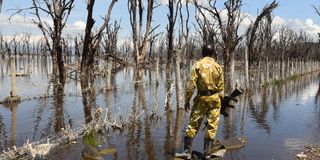Mixed reactions as Nakuru reacts to 'Giza Ziwani' investigative series

KWS officer looking at a submerged fence at the Lake Nakuru National Park.
Over the weekend, Mtaa Wangu ran an investigative series titled GizaZiwani, which aimed to shed light on the happenings at Lake Nakuru National Park between the community and the officers, beyond the story of Brian Odhiambo.
He is among the young men who disappeared after he was taken by KWS officers and has been missing since the start of the year.
Immediately after our teaser video, Edward Kimani Muthoni put out a warning to visitors, saying, “Local and international tourists should avoid the kill zone at all costs... why pay to walk on unmarked graves of innocent people?”
Ja Mu and Odouglas Oira question, “who exactly goes into the protected lake and for what purpose?”.
Alan Ring opines, “I think their bodies were fed to the wild animals, maybe crocodiles or other predators, though that’s according to my opinion.”
In the article that spoke about what happens to fishermen when arrested for illegal fishing in Lake Nakuru, many, including Paul Paulo, says, “Those who do fishing independently are the ones who are taken for trespassing in the park. There are those who fish and share the spoils with KWS officials. Those are 'legal,' to do the trade without harassment.”
Wanderi Kamau adds, “They are battered to unconsciousness, then killed and buried inside the park. It’s the most dangerous business one should think of doing in life.”
Adalla Hassan shares, “Nimeskiza podcast flani ya msee wa KWS... kulingana na their day-to-day operations within protected areas... huyo fisherman hana lake... those rangers assumed he was a poacher.”
In our story about the mystery of bruised and battered bodies found along Lake Nakuru, Kipkorir Moses says, “Lake Nakuru is a crime scene,” while Patrick Kinoti adds, “Lake Nakuru has now become 'River Yala.' Dead bodies are found now and then, and these killings must stop. Even God is annoyed with Kenya and Kenyans.”
Banda Jackson poses, “Alafu we expect the park to do and bring income with all those blood found in that park. Nkt!” as Grace Njoki asks, “What is happening in Nakuru? Why is there no uproar about people getting killed this way? The natural resources in Kenya ought to belong to Kenyans.”
Abdi Babaake says, “Those young men are only looking for something to feed their families. Life is hard. They are only fishing and not poachers.”
On our story on how a buffalo saved a woman from rape in Lake Nakuru National Park, Victor Mac'Simwa says, “When you read the story, it’s with no doubt that the young man who disappeared and is alleged to have been taken by the KWS officers is not far from the truth.”
In our story about a ‘fisherman revealing disturbing details of the illegal fish business in Lake Nakuru,’ our top fan Kipkorir Amos Bomet says, “I have sooo many questions; I thought Lake Nakuru is an alkaline lake! Why hasn’t it been studied? Why did the lake water levels rise, and why is the lake teeming with fish life?”
Ni Laban sarcastically says, “Na samaki zenyewe zinasema aje?”
Stephen Rotich, from his perspective, opines, “Again, it is illegal to fish in Lake Nakuru. The fish is contaminated and not fit for human consumption. These women must stop feeding people poison.”
“The real question would be when it apparently became illegal to eat or fish from the lake... and why deny the populace from utilizing the natural resources?” Ronald Kimwetich Arap Kamau asks.
The stories surrounding Lake Nakuru highlight the deep tensions between conservation efforts and the struggles of local communities who rely on the resources surrounding the park for survival.


